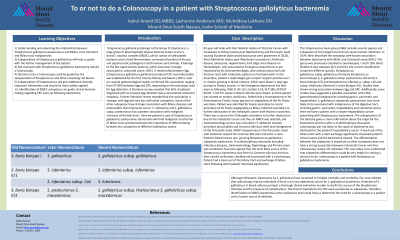Tuesday Poster Session
Category: Colon
P3695 - To or Not to Do a Colonoscopy in a Patient With Streptococcus Gallolyticus Bacteremia
Tuesday, October 29, 2024
10:30 AM - 4:00 PM ET
Location: Exhibit Hall E

Has Audio

Rahul Anand, MD, DO
Mount Sinai South Nassau
East Meadow, NY
Presenting Author(s)
Rahul Anand, MD, DO1, Lachonne Anderson, MD2
1Mount Sinai South Nassau, East Meadow, NY; 2Mount Sinai South Nassau, Oceanside, NY
Introduction: Streptococcus gallolyticus belongs to the Group D streptococci, a large group of phenotypically diverse bacteria known as the S. bovis/S. equinus complex (SBSEC), which consist of safe-graded bacteria used in food-fermentation, commensal bacteria of the gut and opportunistic pathogens in both humans and animals.It belongs to the few opportunistic bacteria, which have been strongly associated to colorectal cancer (CRC). A literature survey revealed that 65% of patients diagnosed with an invasive Sgg infection had a concomitant colorectal neoplasia. This case will demonstrate the importance of differentiating between the subspecies of different Gallolyticus strains.
Case Description/Methods: 83 year old male with Past Medical History of HTN, ESRD (on HD), prostate cancer with metastases to kidney (s/p nephrectomy) and pancreas head causing duodenal obstruction s/p stent placement 8/2023, Afib s/p watchman's (not on AC), Parkinson's, glaucoma who presented to Emergency department as his Gastroeneterologist noticed Liver function tests with cholangitis pattern and his nephrologist got report of gram positive cocci in clusters growing in blood cultures. In ED WBC 8, Hb 10.2, lactate 3.18, ALP 589, AST/ALT 92/92, T. bili 0.5, lipase 4. Blood cultures were growing Streptococcus gallolyticus.Patinet was admitted and treated for Bacteremia secondary to recent AV fistula procedure vs biliary infection secondary to further obstruction of the metastatic cancer with lesions in pancreas. Patient was started on empriric antibiotics and Gastroeneterogy service was consulted. GI verified the subspecies of Streptococcus gallolyticus to pasteurianus and after the verification decided not to proceed with the Colonoscopy.
Discussion: A relationship between Streptococcus gallolyticus sub Gallolyticus association with CRC was established for the first time in 1951.Later on, several epidemiological studies confirmed this association ranging from 47 to 85% between the association. The differentiation between the subspecies is important as other subspecies is not a well known association between Colorectal Cancer and thus Colonoscopy maybe not indicated. This case helps us to understand that subspecies differentiation could be very helpful in making a decision for a Colonoscopy.
Disclosures:
Rahul Anand, MD, DO1, Lachonne Anderson, MD2. P3695 - To or Not to Do a Colonoscopy in a Patient With <i>Streptococcus Gallolyticus Bacteremia</i>, ACG 2024 Annual Scientific Meeting Abstracts. Philadelphia, PA: American College of Gastroenterology.
1Mount Sinai South Nassau, East Meadow, NY; 2Mount Sinai South Nassau, Oceanside, NY
Introduction: Streptococcus gallolyticus belongs to the Group D streptococci, a large group of phenotypically diverse bacteria known as the S. bovis/S. equinus complex (SBSEC), which consist of safe-graded bacteria used in food-fermentation, commensal bacteria of the gut and opportunistic pathogens in both humans and animals.It belongs to the few opportunistic bacteria, which have been strongly associated to colorectal cancer (CRC). A literature survey revealed that 65% of patients diagnosed with an invasive Sgg infection had a concomitant colorectal neoplasia. This case will demonstrate the importance of differentiating between the subspecies of different Gallolyticus strains.
Case Description/Methods: 83 year old male with Past Medical History of HTN, ESRD (on HD), prostate cancer with metastases to kidney (s/p nephrectomy) and pancreas head causing duodenal obstruction s/p stent placement 8/2023, Afib s/p watchman's (not on AC), Parkinson's, glaucoma who presented to Emergency department as his Gastroeneterologist noticed Liver function tests with cholangitis pattern and his nephrologist got report of gram positive cocci in clusters growing in blood cultures. In ED WBC 8, Hb 10.2, lactate 3.18, ALP 589, AST/ALT 92/92, T. bili 0.5, lipase 4. Blood cultures were growing Streptococcus gallolyticus.Patinet was admitted and treated for Bacteremia secondary to recent AV fistula procedure vs biliary infection secondary to further obstruction of the metastatic cancer with lesions in pancreas. Patient was started on empriric antibiotics and Gastroeneterogy service was consulted. GI verified the subspecies of Streptococcus gallolyticus to pasteurianus and after the verification decided not to proceed with the Colonoscopy.
Discussion: A relationship between Streptococcus gallolyticus sub Gallolyticus association with CRC was established for the first time in 1951.Later on, several epidemiological studies confirmed this association ranging from 47 to 85% between the association. The differentiation between the subspecies is important as other subspecies is not a well known association between Colorectal Cancer and thus Colonoscopy maybe not indicated. This case helps us to understand that subspecies differentiation could be very helpful in making a decision for a Colonoscopy.
Disclosures:
Rahul Anand indicated no relevant financial relationships.
Lachonne Anderson indicated no relevant financial relationships.
Rahul Anand, MD, DO1, Lachonne Anderson, MD2. P3695 - To or Not to Do a Colonoscopy in a Patient With <i>Streptococcus Gallolyticus Bacteremia</i>, ACG 2024 Annual Scientific Meeting Abstracts. Philadelphia, PA: American College of Gastroenterology.
